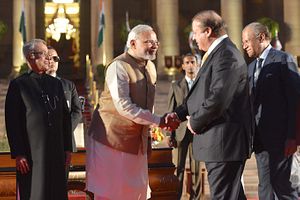It is probably hardwired into the delicate structure of South Asian politics—which mainly revolves around the two nuclear-armed neighbors of Pakistan and India— that peace cannot last for too long. History has seen a series of failed efforts from both sides to establish cordial relations: the Nehru-Liaquat pact in 1950; the Ayub Khan-Shastri talks in the aftermath of the 1965 war; the Sharif-Vajpayee talks, culminating in the Lahore Declaration of 1999; the bilateral discussions between Indian Prime Minister Vajpayee and Pakistani President Musharraf in 2001; and most recently the meetings between Prime Ministers Narendra Modi and Nawaz Sharif.
All these attempts have either ended in futility or provided only a short-term respite. Recent efforts seem headed in the same direction, with the Pakistani high commissioner in India, Abdul Basit, revealing the suspension of dialogue between the two countries earlier this month.
Basit’s statement came just after a Pakistani Joint Investigation Team (JIT) visited India to probe the January attack on the Pathankot air base. He stated that the peace process had been suspended and that there was “no meeting scheduled between foreign secretaries yet.” Referring to the arrest of Kulbhushan Yadav, alleged to be an Indian spy, in Pakistan, Basit added: “We all are aware of those who seek to create unrest in Pakistan and destabilize the country.”
That the two sides understood the importance of continuing talks in the aftermath of the Pathankot attack was much appreciated by observers. However, recent calamitous developments have put the dialogue process in peril yet again. India claimed the Pathankot attack was carried out by militants coming from across the border and asked Islamabad to take immediate action against the perpetrators. To its credit, Pakistan surprisingly announced full cooperation in the investigation and assured all necessary steps in this regard. Consequently, a First Information Report (FIR) against unknown persons was lodged in the Pakistani city of Gujranwala under the Pakistan Penal Code and the Anti-Terrorism Act.
India, however, considered the FIR a “small step” and expressed disappointment that Maulana Masood Azhar, chief of Jaish-e-Muhammad (JEM), was not named. India also put forth a resolution in the United Nations to place Masood Azhar on a list of global terrorists, but this was blocked by China.
When the JIT from Pakistan traveled to India to probe the Pathankot matter alongside Indian officials, the team found it hard to come up with conclusive results because India turned down Pakistan’s request to access witnesses inside the airbase. This led Pakistan to claim that India had not been cooperative enough in the investigation.
Meanwhile, in late March Pakistani authorities arrested Kulbhushan Yadav, alleged to be an agent of India’s intelligence agency Research and Analysis Wing (RAW), in the restive province of Balochistan. Subsequently, Pakistan released a video of Yadav confessing to carrying out belligerent activities in Pakistan to sabotage peace in the country. Together, Yadav’s arrest and India’s non-cooperation in the Pathankot attack investigation caused Pakistan to announce suspension of peace talks.
Since Narendra Modi was sworn in as prime minister, he has generally taken a tough tone towards Pakistan. However, in December 2015, he paid a surprise visit to Pakistan which led to optimism regarding bilateral relations. Pakistani Prime Minister Nawaz Sharif has also asserted his aspiration to build friendly yet equality-based ties with India. After the arrest of Yadav, Sharif even kept quiet over the issue, which was described by a government official as a deliberate move. Yet this silence—which also sparked huge political criticism for Sharif at home—could not prevent the suspension of talks.
Historically, any attempt to improve the India-Pakistan relationship or to come to the table for composite dialogue has been stalled due to the Kashmir issue. The more India stresses the inclusion of terrorism as an issue in bilateral talks, the more vociferous Pakistan is about Kashmir. Today Kashmir is less of the focus, but the Pathankot attack and arrest of Yadav became the new breaking point in negotiations.
Unfortunately, India-Pakistan hostilities are not tied to one particular issue. Though many believe a peaceful settlement of the Kashmir conundrum would bring about normality, there is no guarantee of durable peace. Geopolitical factors are increasingly important, including India’s recent approach toward Afghanistan, Iran, and Central Asia as well as Pakistan’s conviviality with China.
India is developing the Chabahar port in Iran, providing political, economic, military, and strategic support to Afghanistan, and seeking access to Central Asia. All these goals are directly or indirectly related to Pakistan. Only a helpful Islamabad could remove hurdles for India must clear to reach Afghanistan and beyond, but Islamabad continues to see the Indian presence on its western flank as an existential threat. Conversely, India has been wary of the growing Islamabad-Beijing connections, especially with the commencement of the China-Pakistan Economic Corridor (CPEC).
Resolving only one issue — even the Kashmir question — will not unlock peace in South Asia. If there is the political intention to gradually resolve all pertinent issues gradually, then both Pakistan and India can compromise or bargain at some level. Therefore, the governments should not allow their dialogues to be hijacked by the Pathankot attack or the spy issue. Neither Islamabad nor New Delhi should deviate from their commitment to secure peace and regional stability.
Muhammad Daim Fazil is Lecturer of International Relations and Political Science at University of Gujrat, Sialkot Campus, Pakistan.
































